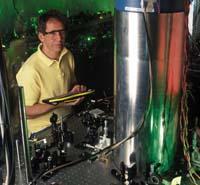The most accurate watch contains a mercury atom in the heart

The American Institute of Technologies and Standards (NIST) presents an experimental watch based on the oscillations of a mercury atom. That watch is so precise that in 400 million years it will not win or lose a second. The clock has a low temperature mercury ion inside an electromagnetic cell. In this situation, the ion vibrates at the frequency of visible light.
If international researchers agree to build a watch based on the mercury atom, it will replace clocks using the cesium atom. Clocks measuring cesium oscillations lose or earn a second every 70 million years. In addition, the cession atom vibrates at the frequency of microwaves and the mercury atom at the frequency of visible light. Due to the higher frequency of the mercury atom, the oscillation time can be divided into more units, so accuracy is gained.
If you replace the watch based on the cesium atom, the new watch that measures the mercury oscillations will have many applications. In addition to calibrating world clocks, you will be responsible for synchronizing navigation systems, position and network and satellite communications. In addition, it will serve to investigate whether certain constants of Physics vary over time.
Buletina
Bidali zure helbide elektronikoa eta jaso asteroko buletina zure sarrera-ontzian











